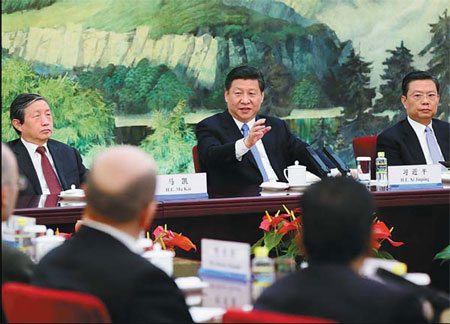The view from the outside world
Updated: 2012-12-10 09:41
(China Daily)
|
||||||||
|
Xi Jinping (center), general secretary of the Communist Party of China Central Committee, at a meeting in Beijing on Wednesday with 20 foreign experts who are working in China. Wu Zhiyi / China Daily |
Editor's note: China Daily canvassed the opinions of a number of experts overseas about the new style of leadership promoted by Xi Jinping and his colleagues.
Tom Watkins, former Michigan superintendent of public instruction
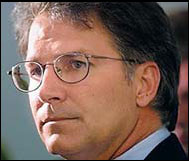
There is an old expression that everyone's grandma has told them - "You only have one chance to make a first impression."
It seems Xi Jinping learned this saying during his visit to Iowa, in the heart of the US Midwest, when he visited in the early 1980s.
China's new leader is setting a new example, calling for an end to conspicuous consumption and special treatment for top government officials and Communist Party leaders.
Xi Jinping is resetting the stage about what is acceptable behavior by top Chinese officials. He seems to be extremely comfortable in his own skin and wants Chinese Party leaders to conduct the People's business in a more down-to-earth way.
This new policy is being noticed by the officials themselves and ordinary citizens.
There is also a business technique used by new leaders called, "Painting the lobby." What this saying means is that a new leader must demonstrate early on that "a new day has arrived". This can be done in concrete ways, i.e., by painting the lobby.
Xi is painting the lobby and setting a new tone of leadership in China. His strong anti-corruption language signals in a subtle way that there is a new leader in town and the Party will not tolerate abuses of official power.
The new general secretary it seems is acting on an old Chinese saying as well, as he implements the tough new anti-corruption measures and conspicuous consumption by top officials: " Kill the chickens to scare the monkeys."
Within weeks of enacting the new policy, a top-level Chinese official is being investigated for "breaching party discipline". This action underscores the seriousness of a new anti-corruption drive undertaken by China's new top leaders.
Time will tell if the paint in the lobby will fade or this is a new day of "Serve the People".
Tom Watkins was talking to Yu Wei.
Dennis Pamlin, founder of Swedish consultancy 21st Century Frontiers

The Rules of Eight Points are a refreshingly honest response to the challenges of credibility facing most governments around the world. These indicate a genuine will to ensure that the leadership is leading toward the future and not living in the past. Ensuring a humble political leadership is something that is much needed all around the world as the distance between people and the political leaders has been growing for many years. If China could help inspire a trend to close the gap it would be very valuable. Moving forward, these eight points could be supported by two developments.
First, measurable targets and official reporting. In an age of rumors and social media it is important to have clear goals so that it is clear what kind of progress is taking place. Measurable goals also make it easier to evaluate policies on a regular basis, e.g. once every year. Clear targets also make it easier to deal with a mistake, because the important thing is overall development, not a single mistake.
Second, the eight goals are currently formulated to reduce the negatives. The focus is on bad things that should be reduced. It is a good first step, but such an initiative would also benefit from clear, positive goals, that also should be possible to measure. Some ideas for such targets: A 25 percent increase in meetings with the grassroots; provide a list of the top 800 most-urgent practical problems that people have mentioned; ensure that 50 percent of official documents are freely available in digital formats (and with the opportunity for people to comment on them); introduce transparency regarding visits and meetings between members of the Political Bureau and other stakeholders, including a list of all those who have met Politburo members more than four times.
Dennis Pamlin was talking to Fu Jing.
Jon Taylor, professor of political science at the University of St Thomas in Houston, Texas
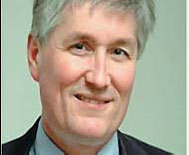
In a word: refreshing. My guess is that the average Western reader of the Washington Post story is not familiar with Confucius. Xi Jinping's call for the Rules of Eight Points immediately reminded me of a quote from Confucius in The Analects: "The superior man is modest in his speech, but exceeds in his actions." It evokes a long-held Chinese tradition: modesty and humility. To be blunt, the Party needed a measure of modesty and humility to restore confidence in its position as China's governing party.
In his role as General Secretary of CPC Central Committee, Xi and his colleagues are attempting to revitalize the image of the Party in the eyes of the Chinese public. Concerns about how several highly publicized corruption cases, particularly Bo Xilai, have damaged the Party in the eyes of the average Chinese citizen - and how that may impact social stability, confidence in the Party's role as the leading governing party of China, and continuing economic reforms - is at the heart of this call for simplification, plain language, and a more informal style in meetings and public activities.
What does this call for a more modest approach actually mean in practical terms? Shorter speeches, less rhetoric, a more businesslike approach to meetings and official gatherings, less extravagance and spending on official gatherings, fewer official tours and a reduced number of foreign trips. Many in the West and elsewhere fail to understand the uncanny ability of the CPC to reform, revitalize and renew itself in order to maintain its primacy as a vanguard party and ruling party. Xi's call for "the renaissance of the Chinese nation" on the final day of the 18th National Party Congress was an example of this. The Rules of Eight Points is another.
Additionally, I should note that I believe that Xi's call for "the renaissance of the Chinese nation" was not just political rhetoric. Why? Because the speeches given by Xi Jinping, Li Keqiang, Wang Qishan and other members of the new Standing Committee since the 18th National Party Congress suggests a very visible and public commitment to moral renewal on the part of the Party. In particular, three areas are likely to be pursued by the CPC over the next five years: Vigorously prosecuting corruption,which impacts both the Party's credibility and legitimacy; a stronger commitment to economic reform and social stability; and a more dynamic foreign policy.
This is already beginning to happen. In a move similar to Deng Xiaoping 20 years ago, Xi has now made his own "Southern Tour" after calling for CPC reform: The Rules of Eight Points. To me it's obvious that Xi chose Shenzhen as well as Zhuhai for his first tour in order to show his determination to further deepen China's reform, as well as to pay tribute to Deng Xiaoping and his father, Xi Zhongxun and their commitment to reform. Most will be unaware that it was Xi Zhongxun who was instrumental in establishing the Special Economic Zone, which drove Deng's reformist program.
Jon Taylor was talking to Zhang Yuwei.
Nicola Casarini, research fellow at the EU Institute for Security Studies

The new working rules and styles of China's new leadership are unexpected - but very welcome - news. If the new Chinese leadership is able to implement the changes, it will give substance to a declared, but sometimes rhetorical, wish to promote change. I think that this initiative will help in reducing the perceived distance between China's leaders and the people, as well as helping to boost China's image abroad.
There are now growing expectations that alongside new working rules and styles, the new Chinese leadership will be able to push forward economic and political reforms in earnest.
I think that Mr Xi and other high-level officials are aiming to reduce the perceived gap between those at the top and the Chinese masses. Moreover, they also want to project a different image of China abroad.
Will they succeed? It's difficult to answer now, but we do hope that they will. A successful implementation of these new working rules and styles will have consequences for both domestic and foreign policy.
Nicola Casarini was talking to Zhang Chunyan.
Lung Chi-ming, chairman of the HK Youth Exchange Promotion United Association
The seven-member Standing Committee of the Political Bureau of CPC Central Committee already set an example for ranking officials by going to a public function without clearing the streets for their motorcade or welcoming ceremony upon their arrival before the Rules of Eight Points were formally announced. This indicates the central leadership core is determined to implement the new rules from top down starting with themselves.
Lung Chi-ming published in Wen Wei Po.
Peter Ho, professor of Chinese economy and development and co-director of the Modern East Asia Research Centre at Leiden University in the Netherlands
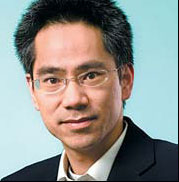
I think these new rules are particularly encouraging. In general, my impression is that the new leadership is trying to effect a new style of governance and it has already conveyed this message in various ways.
I greatly concur with the aim to set an example to change the style of governance from the top, yet, there are two caveats here.
First, organizational and policy change is by definition always a two-way communication, and it needs innovation and change from the grassroots, as well as from the top.
Second, change is a long-term process, and it will need a consistent and continued commitment from leaders at all levels to see this through.
It's more than just changing the rules, as it boils down to a change in culture.
Peter Ho was talking to Zhang Chunyan.
Rana Mitter, director-designate of the University of Oxford China Centre
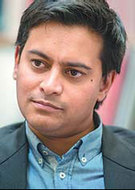
If the new working rules and styles are implemented, then it will be a very welcome change in the style of leadership. If Chinese leaders adopt a low-key style then they will be better equipped to understand the problems of ordinary people.
I think Mr Xi and other officials are concerned that China's wider population needs to feel that the Party understands their concerns about a variety of issues: income inequality in society, the need for new policies on healthcare and pensions, and a greater ability to speak freely about key issues.
If the new leadership is seriously able to overcome the bureaucratic hierarchies and talk to China's people, then they will be able to find new ways to deal with these urgent issues.
Rana Mitter was talking to Zhang Chunyan.
(China Daily 12/10/2012 page7)

 Relief reaches isolated village
Relief reaches isolated village
 Rainfall poses new threats to quake-hit region
Rainfall poses new threats to quake-hit region
 Funerals begin for Boston bombing victims
Funerals begin for Boston bombing victims
 Quake takeaway from China's Air Force
Quake takeaway from China's Air Force
 Obama celebrates young inventors at science fair
Obama celebrates young inventors at science fair
 Earth Day marked around the world
Earth Day marked around the world
 Volunteer team helping students find sense of normalcy
Volunteer team helping students find sense of normalcy
 Ethnic groups quick to join rescue efforts
Ethnic groups quick to join rescue efforts
Most Viewed
Editor's Picks

|

|

|

|

|

|
Today's Top News
Health new priority for quake zone
Xi meets US top military officer
Japan's boats driven out of Diaoyu
China mulls online shopping legislation
Bird flu death toll rises to 22
Putin appoints new ambassador to China
Japanese ships blocked from Diaoyu Islands
Inspired by Guan, more Chinese pick up golf
US Weekly

|

|
